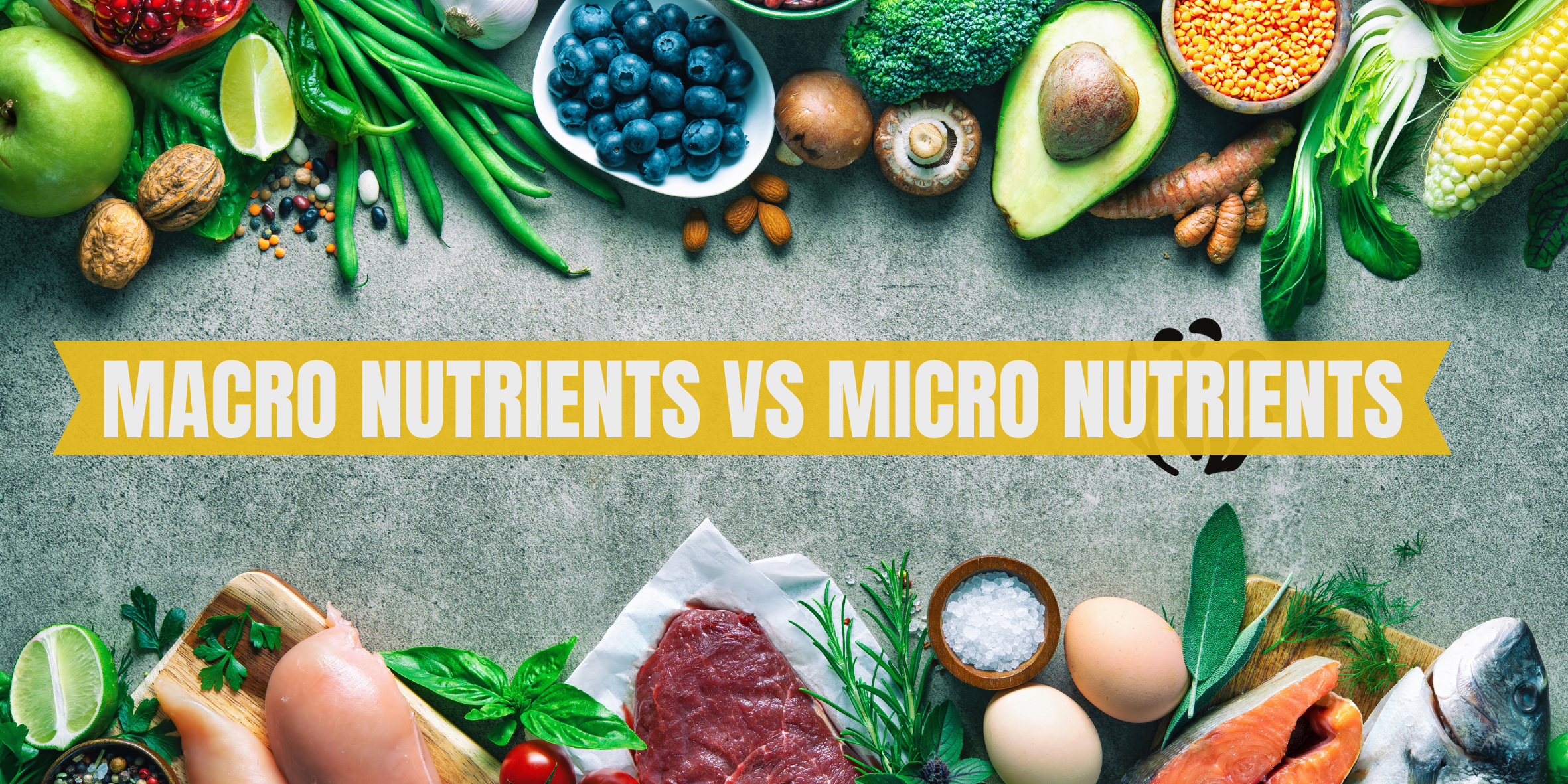
Macro Nutrients vs. Micro Nutrients: What Are They and How Do They Benefit You?
You have all probably heard of the importance of a well-balanced diet, with a focus on the three main Macronutrients such as Carbohydrates, Fats, and Proteins. But there is another group of nutrients that are often overlooked and they are essential for your health and well-being: Micronutrients. These tiny powerhouses of vitamins and minerals may be required in smaller doses, but they play a massive role in keeping your body healthy and functioning at its very best.
In this article, I aim to shine a bit of light on the key differences between Macro and Micro Nutrients and offer a new perspective on the way we consume our food. Becoming mindful of what is going into our bodies and how it can be to your benefit.
So:
What are Macro Nutrients?
- Carbohydrates. Carbohydrates are the body’s primary source of energy. They are found in foods like grains, bread, pasta, rice, fruits, and vegetables. It’s important to choose complex carbohydrates (e.g., whole grains) over simple sugars for sustained energy and better nutrition. Balancing carbohydrate intake involves consuming an appropriate amount to meet your energy needs without excessive consumption.
- Proteins. Proteins are crucial for building and repairing tissues, as well as for various metabolic processes. Good sources of protein include lean meats, poultry, fish, eggs, dairy products, legumes, and nuts. To balance protein intake, ensure you get an adequate amount for your age, gender, and activity level, but avoid excessive protein consumption.
- Fats. Fats provide long-term energy storage and are essential for the absorption of fat-soluble vitamins (A, D, E, and K). Healthy sources of fats include avocados, nuts, seeds, olive oil, and fatty fish like salmon. Balance fat intake by focusing on unsaturated fats (e.g., monounsaturated and polyunsaturated fats) while limiting saturated and trans fats, which can contribute to heart disease.
Balancing macronutrients in your diet involves considering your individual needs, such as age, gender, activity level, and specific health goals.
It’s important to:
- Understand your daily calorie needs and distribute those calories among carbohydrates, proteins, and fats in a way that aligns with your goals, whether it’s weight management, athletic performance, or general well-being.
- Choose a variety of foods from each macronutrient group to ensure you receive a wide range of essential nutrients.
- Be mindful of portion sizes to prevent overeating and to maintain a balanced diet.
- Adapt your macronutrient intake over time based on changes in your lifestyle, goals, and health needs.
What are Micro Nutrients?
- Vitamins. Examples include vitamin A, vitamin C, vitamin D, and the B-complex vitamins (e.g., B1, B2, B3, B6, B12).
- Minerals. Examples include calcium, iron, magnesium, zinc, and potassium.
Balancing micronutrients involves ensuring that you receive an adequate and diverse supply of these vitamins and minerals in your diet.
Here are some ways to achieve that:
- Eat a Variety of Foods. Different foods contain varying micronutrient profiles. By consuming a wide range of fruits, vegetables, whole grains, lean proteins, and dairy or dairy alternatives, you increase your chances of obtaining a diverse array of micronutrients.
- Follow Dietary Guidelines. Pay attention to dietary guidelines specific to your country, which often provide recommendations on daily micronutrient intake based on age, gender, and life stage.
- Consider Supplements. If you have specific dietary restrictions or health conditions that make it challenging to meet your micronutrient needs through food alone, you may need to take dietary supplements. However, it’s essential to consult a healthcare professional before starting any supplement regimen.
- Be Mindful of Cooking and Storage. Micronutrients can be sensitive to heat, light, and air. Cooking methods that preserve the nutrient content, such as steaming or microwaving, can help retain more vitamins and minerals. Proper food storage is also essential to prevent nutrient degradation.
- Avoid Excessive Intake. While micronutrient deficiencies can be harmful, excessive intake of certain vitamins and minerals (vitamin toxicity) can also have adverse health effects. Be cautious about overusing supplements, especially for fat-soluble vitamins like vitamin A and vitamin D.
- Monitor Your Diet. If you have specific health concerns or conditions that require you to closely manage your intake of certain micronutrients, consider keeping a food diary or working with a registered dietitian to ensure you’re meeting your needs.

How can you improve your nutrition TODAY?
How to enjoy the good stuff and be healthy?
- Get enough protein in your diet to aid muscle regeneration and muscle mass.
- Aim to eat 3 meals per day, consisting of a 40% 40% 20% split between Protein, Fats and Carbohydrates.
- Aim to consume fruit during your snacking times. This will also prevent cravings, as fruits have good natural sugars, leaving you feeling full and satisfied.
- Don’t cut out the good stuff! You can still enjoy foods that aren’t considered ‘healthy’, just in reasonable moderation. If you feel like you’ve overdone it one day, aim to reduce it the next two days, and focus on eating whole foods!
- Consider supplementation, if you are unable to consume the required nutrients. Protein powder, Zinc, and Magnesium are some examples you can take on a daily basis to ensure you are getting enough of the minerals and nutrients your body needs.



